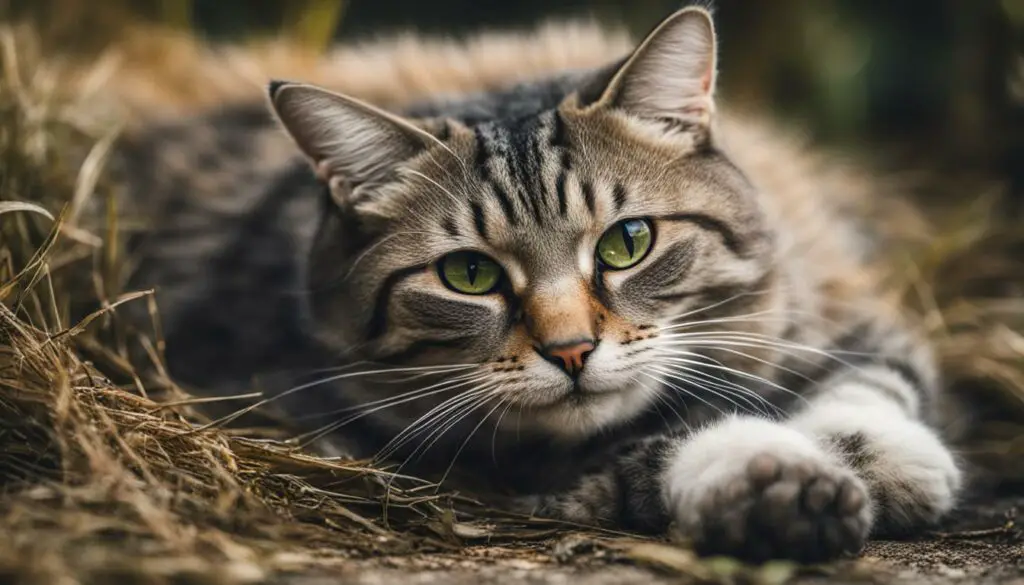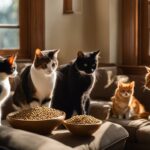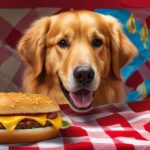As a cat owner, it can be a cause for concern when your feline companion deviates from their usual diet and starts showing signs of illness. One common scenario that cat owners encounter is when their cat eats dog food and subsequently falls ill. This can be a worrisome situation, but understanding the reasons behind it and how to address the issue is crucial for your cat’s health and well-being.
Cats have specific nutritional needs that differ from dogs due to their unique digestive system. They require higher levels of protein and essential amino acids like taurine in their diet. Dog food, on the other hand, is formulated to meet the nutritional needs of dogs, which do not align with the specific requirements of cats. When a cat consumes dog food, it can lead to digestive issues and subsequent illness.
In this article, we will explore the reasons why cats may try dog food, the symptoms they may experience after consuming it, and the remedies to alleviate their discomfort. We will also discuss the importance of proper nutrition for cats and the risks associated with feeding them inappropriate foods.
Key Takeaways:
- If your cat ate dog food and is now sick, it is important to understand that dog food does not meet their specific nutritional needs.
- Symptoms of a cat eating dog food may include vomiting, diarrhea, nausea, drooling, and stomach pain.
- Contacting a veterinarian is crucial if your cat is sick after eating dog food, as they can provide proper guidance and treatment.
- Feeding cats dog food on a regular basis can lead to nutritional imbalances and long-term health issues.
- Preventing cats from eating dog food involves creating separate feeding areas and supervising meal times.
Cat Digestive System and Nutritional Needs
Understanding the digestive system and nutritional needs of cats is essential for their overall health and well-being. Cats are obligate carnivores, which means they require a diet that is primarily meat-based. Unlike dogs, cats have specific dietary requirements that must be met to support their unique physiology.
The digestive system of a cat is designed to efficiently process and absorb nutrients from animal protein. They have a relatively short digestive tract, which allows for the quick break down and absorption of nutrients. Additionally, cats require higher levels of protein and specific amino acids like taurine for optimal health. These nutrients are crucial for maintaining healthy muscles, organs, and immune function.
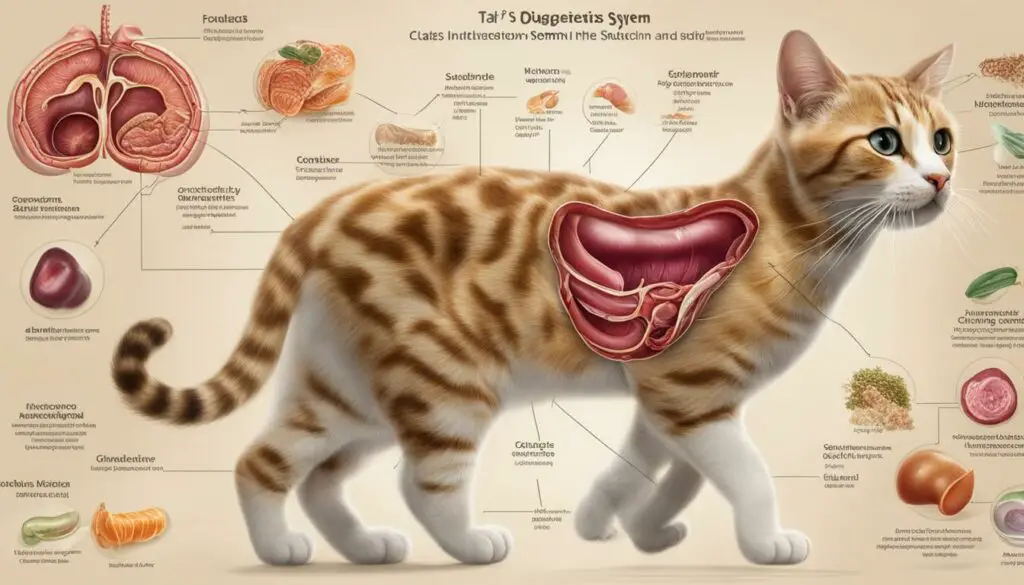
Table: Comparison of Cat and Dog Nutritional Needs
| Nutrient | Cat | Dog |
|---|---|---|
| Protein | Higher requirement | Lower requirement |
| Taurine | Essential nutrient | Not essential |
| Vitamin A | Requires preformed vitamin A | Can convert beta-carotene to vitamin A |
| Fatty Acids | Require arachidonic acid | Can synthesize arachidonic acid |
Feeding a cat dog food can be detrimental to their health as it does not provide the necessary nutrients they require. While a small amount of dog food may not cause immediate harm, a prolonged diet of dog food can lead to nutritional deficiencies and potential health problems for cats. It is important to prioritize a cat’s specific dietary requirements and provide them with a balanced, meat-based diet formulated for their unique needs.
Why Cats May Try Dog Food
Cats are known for their discerning taste and can be quite picky eaters. While their preference is typically for a diet of high-quality cat food, there may be occasions when cats are tempted to sample dog food. So why do cats sometimes eat dog food? Let’s explore a few possible reasons:
Cat Curiosity:
Curiosity is a natural instinct for cats, and they may be intrigued by the unique aroma and taste of dog food. Cats are known to investigate anything new or different in their environment, including the food in their canine counterparts’ bowls.
Textures and Flavors:
Cats have a particular texture and flavor preference when it comes to their food. Dog food often has a different texture and taste compared to cat food, which could attract some cats. However, it’s important to note that many cats find the taste and texture of dog food less appealing than their own specially formulated feline fare.
Food Availability:
Cats are resourceful and opportunistic when it comes to finding food. If a cat’s preferred food is not readily available, they may try dog food as a temporary alternative. However, it’s important to ensure that cats receive proper nutrition from their own cat food to support their specific dietary requirements.
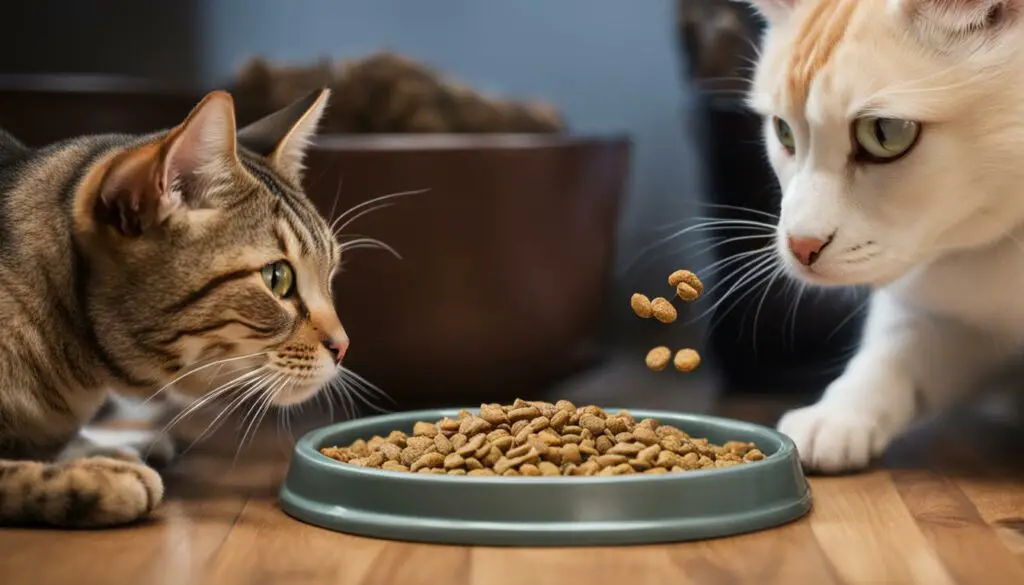
While it’s not uncommon for cats to sample dog food out of curiosity or necessity, it’s crucial to provide cats with a balanced diet formulated specifically for their nutritional needs. Feeding cats a diet tailored to their requirements ensures their overall health and well-being.
Symptoms of a Cat Eating Dog Food
If your cat has consumed dog food, it may experience a range of symptoms indicating digestive distress. It’s important to be aware of these signs so that you can take prompt action to address any potential health issues. Common symptoms of a cat eating dog food include:
- Vomiting: Cats may vomit shortly after consuming dog food. This is their body’s way of expelling something that it recognizes as inappropriate or harmful.
- Diarrhea: A cat that has eaten dog food may also develop diarrhea. This can be characterized by loose or watery stools and can lead to dehydration if not addressed.
- Nausea: Cats may exhibit signs of nausea after consuming dog food. This can manifest as excessive drooling, increased swallowing, and reluctance to eat or drink.
- Stomach Pain: If a cat’s digestive system is not able to properly process dog food, it may experience discomfort or abdominal pain. This can be indicated by restlessness, vocalization, or a hunched posture.
| Symptom | Description |
|---|---|
| Vomiting | Cats may vomit shortly after consuming dog food. This is their body’s way of expelling something that it recognizes as inappropriate or harmful. |
| Diarrhea | A cat that has eaten dog food may also develop diarrhea. This can be characterized by loose or watery stools and can lead to dehydration if not addressed. |
| Nausea | Cats may exhibit signs of nausea after consuming dog food. This can manifest as excessive drooling, increased swallowing, and reluctance to eat or drink. |
| Stomach Pain | If a cat’s digestive system is not able to properly process dog food, it may experience discomfort or abdominal pain. This can be indicated by restlessness, vocalization, or a hunched posture. |
If you notice any of these symptoms in your cat after it has consumed dog food, it is recommended to monitor its behavior closely. If the symptoms persist or worsen, it’s important to seek veterinary care. A veterinarian can provide a proper diagnosis and recommend appropriate treatment options to help your cat recover.
Remember, the symptoms mentioned here are not an exhaustive list, and individual cats may exhibit additional signs of discomfort or illness. It’s always best to consult with a veterinarian for personalized advice and guidance specific to your cat’s needs.
Remedies for a Cat Sick from Eating Dog Food
If your cat has eaten dog food and is experiencing sickness, it is important to take immediate action to alleviate their symptoms and restore their health. Here are some remedies to consider:
1. Contact a Veterinarian
The first step is to consult a veterinarian. They have the expertise to diagnose your cat’s condition and provide appropriate treatment recommendations. A vet can assess the severity of your cat’s sickness and advise you on the best course of action.
2. Withhold Food Temporarily
Your veterinarian may advise you to withhold food from your cat for a period of time. This allows their stomach to rest and recover from the ingestion of dog food. It also helps to prevent further irritation and digestive discomfort.
3. Gradually Introduce a Bland Diet
After a period of fasting, you can gradually reintroduce a bland diet to your cat. Boiled chicken or fish can be a good option as it is easy to digest and gentle on the stomach. Slowly introduce small portions of the bland diet and monitor your cat’s response.
If your cat’s symptoms persist or worsen, it is important to follow up with your veterinarian for further tests and treatment. They may need to administer additional medication or provide specialized care depending on the severity of your cat’s sickness. Remember to always follow your vet’s advice and maintain regular check-ups to ensure your cat’s overall health and well-being.
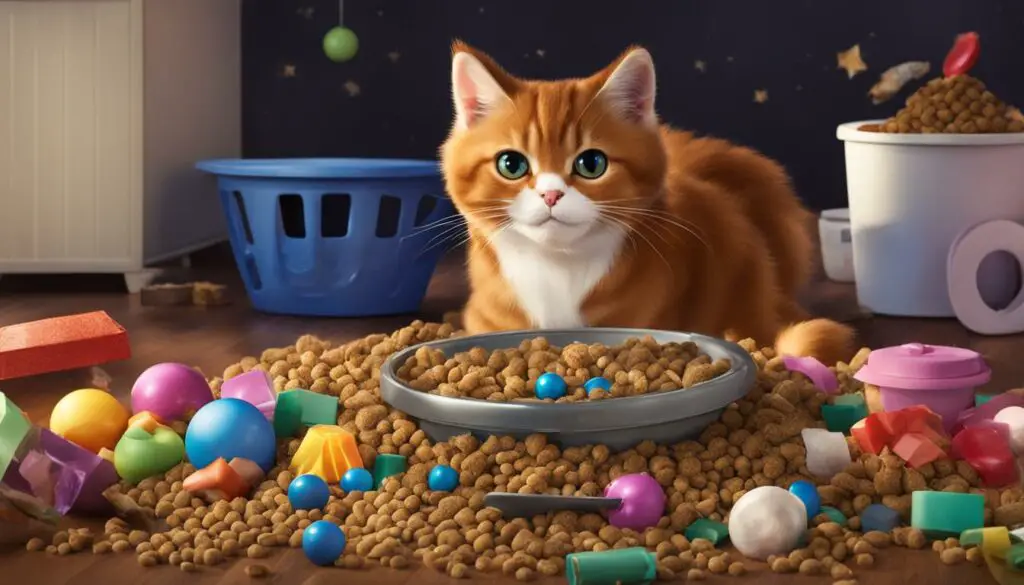
| Remedy | Description |
|---|---|
| Contact a Veterinarian | Seek professional advice from a veterinarian to determine the best course of action for your cat’s specific situation. |
| Withhold Food Temporarily | Following your vet’s guidance, temporarily withhold food to allow your cat’s stomach to rest and recover. |
| Gradually Introduce a Bland Diet | After the fasting period, reintroduce a bland diet, such as boiled chicken or fish, slowly and in small portions. |
| Follow Up with Veterinarian | If symptoms persist or worsen, consult your vet for further tests, treatment, and medical advice. |
Nutritional Differences Between Cat Food and Dog Food
When it comes to cat food vs dog food, there are significant nutritional differences that pet owners need to be aware of. Cats and dogs have unique dietary requirements, and feeding them the wrong type of food can lead to health problems. Understanding these differences is crucial for providing our furry friends with the proper nutrition they need.
One of the main distinctions between cat food and dog food is the protein content. Cats are obligate carnivores, which means they require a higher amount of protein in their diet compared to dogs. Cat food is specifically formulated to meet these protein requirements, usually containing more animal-based protein sources such as chicken or fish.
Additionally, cats have dietary requirements for certain nutrients that are not present in sufficient amounts in dog food. For example, cats require taurine, an amino acid that is crucial for their overall health. Dog food is not fortified with taurine as cats can synthesize it on their own, while cats can suffer from taurine deficiency if they consume dog food regularly.
Feeding your cat dog food can lead to nutritional imbalances and deficiencies, which can have serious consequences for their health.” – Veterinary Nutritionist
Table: Nutritional Differences Between Cat Food and Dog Food
| Nutrients | Cat Food | Dog Food |
|---|---|---|
| Protein | Higher amount, usually animal-based sources | Lower amount, can be plant-based |
| Taurine | Essential nutrient for cats, present in higher amounts | Not fortified, as dogs can synthesize it on their own |
| Vitamin A | Required in preformed active form | Can be derived from precursor carotenoids |
| Arachidonic Acid | Essential fatty acid for cats, derived from animal fats | Not essential for dogs |
It’s important to note that feeding a cat dog food regularly can lead to nutritional imbalances and deficiencies. Cats are physiologically different from dogs, and their dietary needs reflect those differences. Providing them with a balanced and appropriate cat food is vital for their overall health and well-being.
As responsible pet owners, it’s essential to prioritize our cats’ specific dietary requirements. Consulting with a veterinarian can provide personalized guidance and recommendations on the best diet for our feline friends. Remember, a well-nourished cat is a happy and healthy cat.
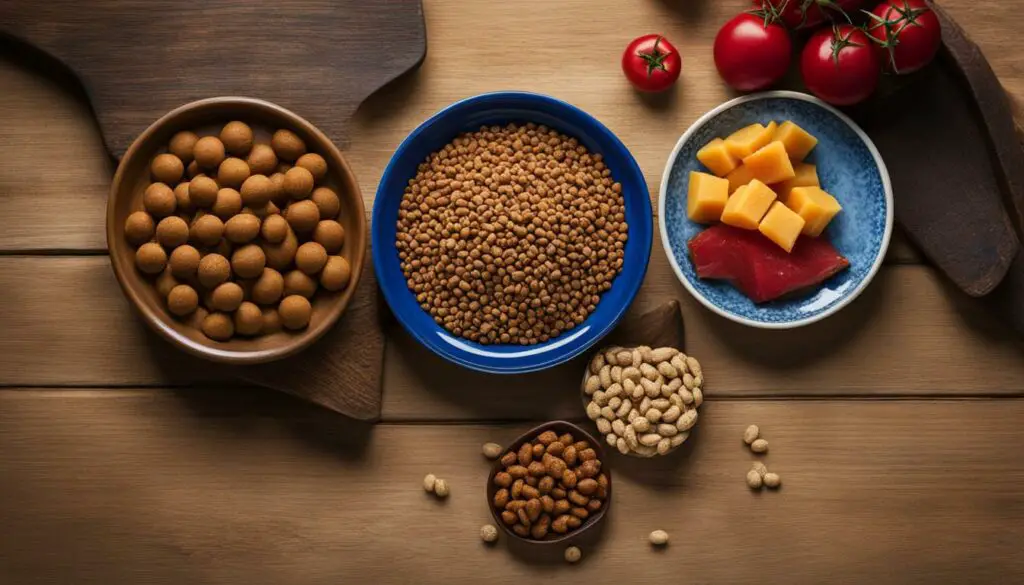
Can Cat Food Be Beneficial for Dogs?
Dogs and cats have different dietary requirements, so it’s important to provide each pet with a diet that meets their specific nutritional needs. While there may be some overlap in certain nutrients between cat food and dog food, it is generally not recommended to feed cat food to dogs on a regular basis.
Table: Nutritional Comparison Between Cat Food and Dog Food
| Nutrient | Cat Food | Dog Food |
|---|---|---|
| Protein | Higher levels | Lower levels |
| Taurine | Essential amino acid for cats | Not as crucial for dogs |
| Essential Fatty Acids | Specifically formulated for cats | Formulated for dogs |
| Vitamin A | Higher levels | Lower levels |
Cat food is formulated to meet the unique nutritional needs of cats, including higher protein levels, specific amino acids like taurine, and other nutrients that support their overall health. Dogs have different nutrient requirements, and feeding them cat food regularly can lead to nutritional imbalances and deficiencies.
- Cat food is higher in protein, which can put a strain on a dog’s kidneys and potentially lead to kidney disease over time.
- Cat food may not provide the ideal balance of nutrients, such as essential fatty acids, that dogs need for optimal health.
- Cat food may not contain the appropriate levels of vitamins and minerals that dogs require.
While there may be some anecdotal evidence of dogs benefiting from occasional consumption of cat food, it is best to consult with a veterinarian for professional advice on your dog’s diet. It’s important to prioritize the nutritional needs of each pet to ensure their long-term health and well-being.
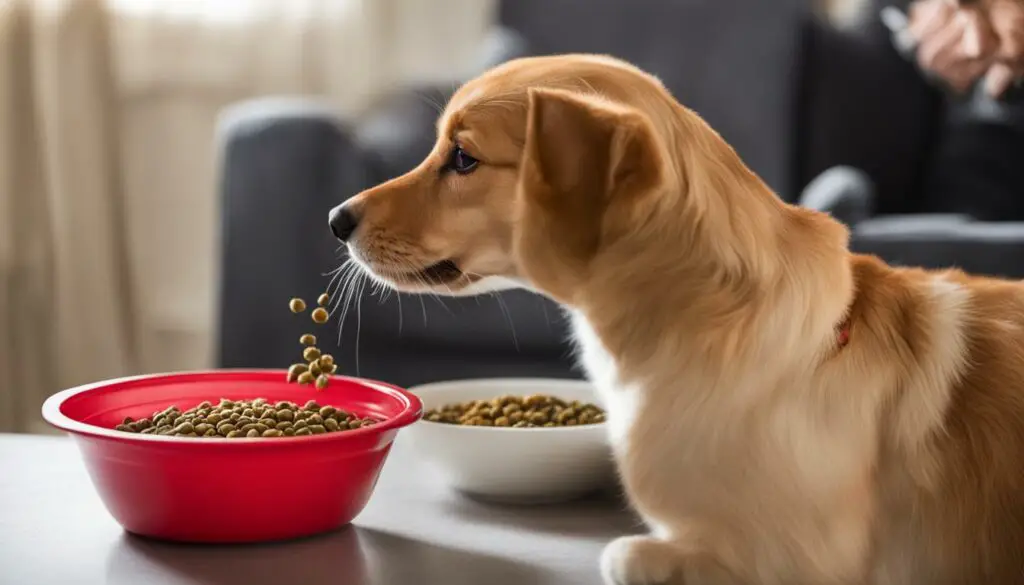
Risks of Feeding Dogs Cat Food
Feeding dogs cat food can pose several risks to their health. While dogs and cats are both domesticated pets, they have different dietary requirements. Dogs are omnivores, which means their bodies are designed to process and derive nutrition from both plant and animal sources. On the other hand, cats are obligate carnivores and require a diet that is high in animal protein and specific nutrients like taurine.
When dogs consume cat food on a regular basis, they may not receive the balanced nutrition they need. Cat food is formulated to meet the unique nutritional needs of cats, which can differ significantly from the requirements of dogs. Feeding a dog cat food can lead to nutritional imbalances, deficiencies, and digestive issues.
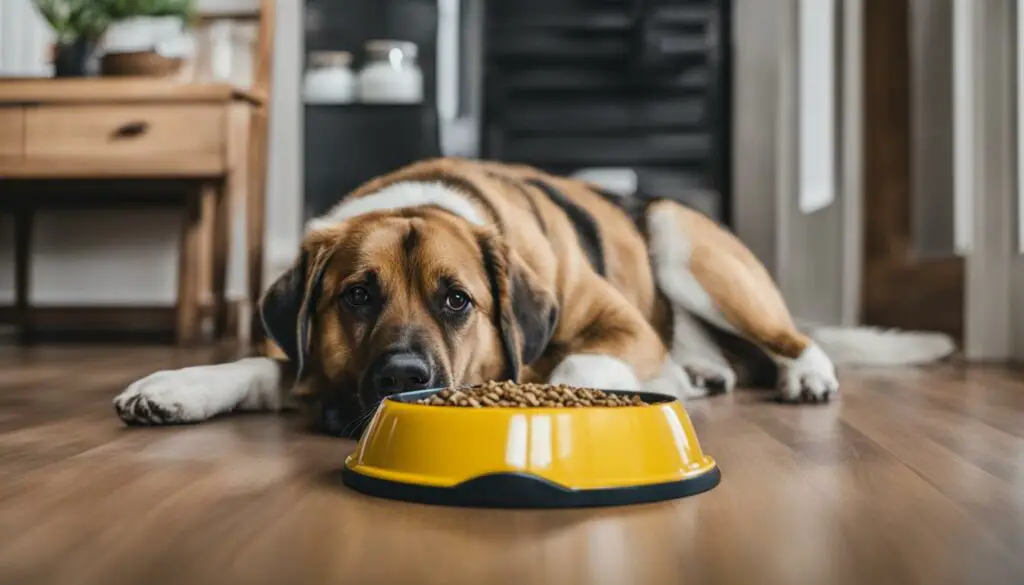
“Feeding dogs cat food can potentially cause health problems in the long term.”
Risks of Feeding Dogs Cat Food:
- Inadequate nutrition: Cat food may not provide dogs with the necessary balance of macronutrients (protein, carbohydrates, fats) and micronutrients (vitamins and minerals) required for their optimal health.
- Taurine deficiency: Cat food contains higher levels of taurine, an essential amino acid for cats. Dogs have lower taurine requirements and can develop taurine deficiency if consistently fed cat food.
- Digestive issues: Dogs have different digestive systems than cats. The high protein content and different ingredient composition of cat food can lead to digestive upset, including diarrhea, vomiting, and gas.
- Weight gain or loss: Cat food is often higher in calories than dog food. Feeding a dog cat food regularly without adjusting portion sizes can result in unhealthy weight gain or weight loss.
- Joint and bone problems: The nutrient profiles in cat food may not support a dog’s joint and bone health, potentially leading to skeletal issues over time.
It is important to prioritize a dog’s specific dietary requirements and feed them a well-balanced dog food formulated to meet their nutritional needs. If you have concerns about your dog’s diet or need guidance on selecting the appropriate food, consult with a veterinarian who can provide tailored advice based on your dog’s individual needs and health conditions.
What to Do If Your Cat Ate Dog Food and Is Sick
If you suspect that your cat has eaten dog food and is experiencing symptoms of illness, it is important to take immediate action. Here are some steps you can follow to help your cat recover:
- Contact a veterinarian: It is crucial to consult a professional veterinary to get a proper diagnosis and treatment plan for your cat. A veterinarian will be able to assess the situation and provide guidance based on your cat’s specific needs and health conditions.
- Monitor your cat’s symptoms: Keep a close eye on your cat’s behavior and note any changes or worsening of symptoms. This information will be valuable for the veterinarian in determining the best course of action.
- Follow the veterinarian’s advice: Once you have consulted a veterinarian, it is essential to follow their instructions carefully. They may recommend withholding food for a specific period to give the cat’s stomach a chance to rest or prescribe medication to alleviate symptoms.
- Make necessary dietary changes: Depending on the severity of the cat’s illness, the veterinarian may recommend a specific diet or dietary changes to aid in the recovery process. It is crucial to adhere to these recommendations to ensure your cat’s nutritional needs are met.
Remember, only a veterinarian can provide the appropriate guidance and treatment for your cat. If you’re unsure about what to do, seeking professional advice is always the best course of action.
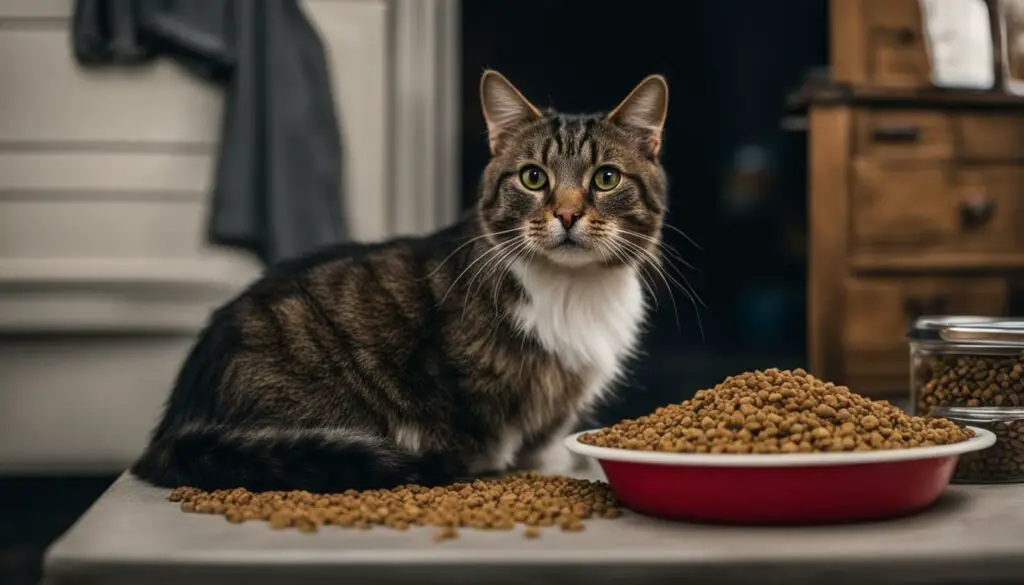
Table: Common Symptoms of Cat Eating Dog Food
| Symptoms | Description |
|---|---|
| Vomiting | Expelling stomach contents forcefully. |
| Diarrhea | Loose, watery stools. |
| Loss of appetite | Decreased interest in food or refusal to eat. |
| Lethargy | Unusual tiredness or lack of energy. |
| Abdominal pain | Discomfort or tenderness in the abdominal area. |
| Nausea | Feeling of queasiness or the urge to vomit. |
It is important to note that these symptoms are not exclusive to cat food ingestion and can indicate other health issues as well. Therefore, it is crucial to consult a veterinarian for an accurate diagnosis and appropriate treatment.
Can Dog Food Be Given to Cats in an Emergency?
In rare emergency situations where cat food is unavailable, a small amount of dog food can be given to a cat as a temporary solution. However, it is important to note that dog food is not nutritionally balanced for cats and should not be used as a long-term substitute. Cats have specific dietary requirements that differ from dogs, and prolonged consumption of dog food can lead to nutritional deficiencies and health issues.
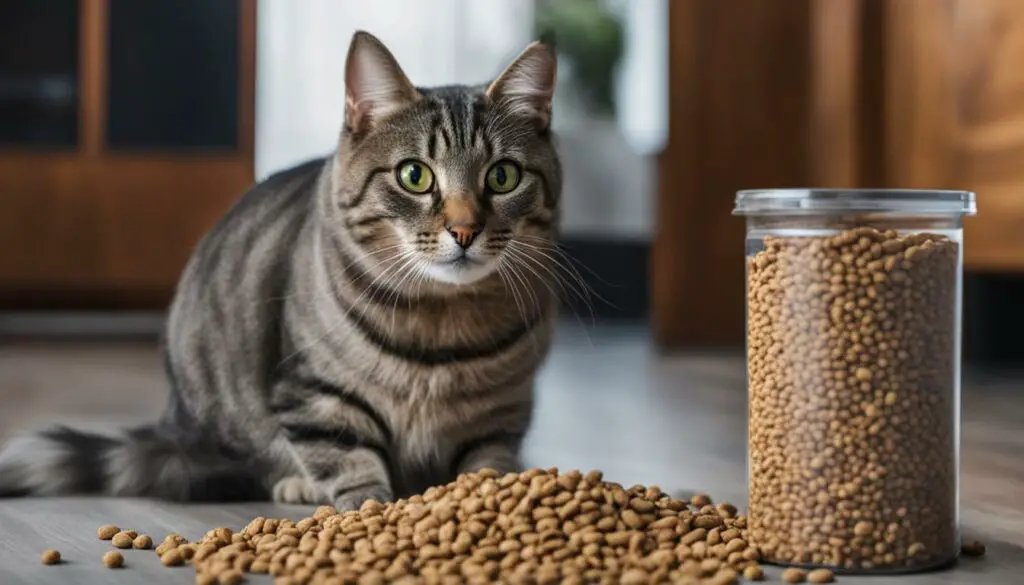
When faced with an emergency where cat food is inaccessible, it is crucial to transition the cat back to a proper cat food as soon as possible. Cat food is formulated specifically to meet the nutritional needs of cats, including the right balance of proteins, vitamins, and minerals. Feeding a cat dog food on a regular basis can result in deficiencies of essential nutrients that are vital for their long-term health and wellbeing.
Consulting a veterinarian is always recommended when dealing with emergency feeding situations for cats. They can provide guidance on the best options for temporary feeding and help ensure that the cat’s nutritional needs are met adequately. Veterinarians may also recommend specific cat-friendly alternatives or provide advice on other temporary feeding options in emergency situations to prevent any potential health issues caused by a suboptimal diet.
How to Keep Cats from Eating Dog Food
Cats can be curious creatures, and it’s not uncommon for them to try to sneak a taste of their canine companion’s food. However, it’s important to prevent cats from eating dog food as it can lead to nutritional imbalances and potential health issues. Here are some tips to keep your cat away from dog food:
Separate Feeding Areas
One of the most effective ways to prevent cats from eating dog food is to establish separate feeding areas for your pets. Place the cat’s food in a designated area that is inaccessible to the dog. This can be a separate room, a closed-off area, or even a different floor of the house. By creating distinct feeding spaces, you can ensure that each pet consumes their appropriate food without any mix-ups.
Supervise Meal Times
Another way to keep cats away from dog food is to supervise meal times. Monitor your pets during their feeding sessions to ensure that the cat doesn’t try to sneak into the dog’s food bowl. If necessary, feed the pets in separate rooms or use feeding gates to keep them separated until they have finished eating.
Use Deterrents
If your cat is particularly persistent in trying to eat dog food, you can use deterrents to discourage them. There are various pet-safe sprays available on the market that have an unpleasant taste or smell for cats. Apply these sprays around the dog’s food bowl to create a deterrent barrier that will discourage the cat from approaching the area.
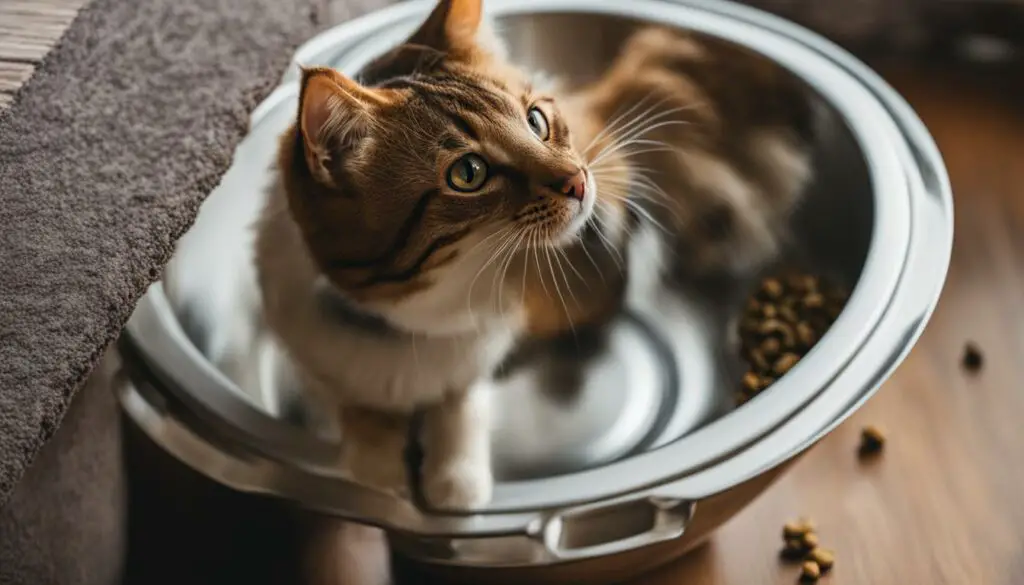
Conclusion
Preventing cats from eating dog food is important to ensure their nutritional needs are met and to avoid potential health issues. By establishing separate feeding areas, supervising meal times, and using deterrents when necessary, you can keep your cat away from dog food and promote their overall health and well-being.
The Importance of Proper Nutrition for Cats
Nutrition plays a crucial role in maintaining the overall health and well-being of cats. Providing your feline friend with a balanced and nutritious diet is essential for their growth, development, and longevity. Cats have unique dietary requirements that differ from those of other animals, including dogs. Feeding them a diet specifically formulated for cats ensures they receive the necessary nutrients to thrive.
Cats are obligate carnivores, meaning they require a diet that is rich in animal protein to meet their nutritional needs. Protein is essential for muscle development, tissue repair, and overall body functions. Additionally, cats require specific amino acids, such as taurine, which are found in high concentrations in animal-based proteins. These nutrients are vital for maintaining healthy heart function, proper vision, and a strong immune system.
“Proper nutrition is crucial for maintaining a cat’s overall health and wellbeing.”
Inadequate nutrition can lead to a range of health issues in cats. Nutritional deficiencies can weaken their immune system, leaving them more susceptible to infections and diseases. Cats that do not receive the appropriate balance of nutrients may also experience digestive problems, skin issues, and dental problems. It is important to prioritize your cat’s nutritional needs by feeding them a high-quality cat food that meets the Association of American Feed Control Officials (AAFCO) guidelines.
| Nutrient | Function | Sources |
|---|---|---|
| Protein | Muscle development, tissue repair | Meat, poultry, fish |
| Taurine | Heart function, vision | Meat, fish |
| Fatty acids | Healthy skin, coat | Fish oil, chicken fat |
| Vitamins and minerals | Overall health and well-being | Fruits, vegetables, organ meats |
Along with a nutritionally balanced diet, cats also require access to fresh water at all times. Hydration is crucial for their overall health and can help prevent urinary tract problems. It’s important to monitor your cat’s weight and body condition regularly and consult with your veterinarian to ensure they are receiving the appropriate amount of food for their age, size, and activity level.
Remember, providing your cat with proper nutrition is a fundamental part of being a responsible pet owner. By prioritizing their dietary needs and choosing high-quality cat food, you can help ensure that your feline companion lives a long, healthy, and happy life.
The Risks of Feeding Inappropriate Foods to Cats
Feeding cats inappropriate foods, such as dog food, can pose significant risks to their health. Cats have unique dietary requirements that differ from dogs, and their bodies are not designed to digest and absorb nutrients from dog food effectively. This can lead to a variety of health issues and nutritional deficiencies.
Cats require higher levels of protein and specific amino acids like taurine in their diet. Dog food typically does not meet these nutritional needs, as it is formulated to meet the requirements of dogs. Feeding cats dog food on a regular basis can result in deficiencies of essential nutrients, which can impact their overall health and well-being.
In addition to nutritional deficiencies, feeding cats inappropriate foods can also lead to digestive upset. Cats may experience symptoms such as vomiting, diarrhea, and stomach pain after consuming dog food. These digestive issues can be uncomfortable for cats and may require veterinary intervention to alleviate.
The Importance of Proper Nutrition for Cats
Proper nutrition is crucial for maintaining a cat’s health and preventing potential health risks. Cats rely on specific nutrients found in their own food to support their unique physiological needs. Feeding them a balanced diet specifically formulated for cats ensures they receive the necessary nutrients for optimal health and reduces the likelihood of encountering health problems associated with inappropriate foods.
Consulting a veterinarian is essential for receiving professional guidance on your cat’s nutrition. Vets can provide personalized advice based on your cat’s specific needs, health conditions, and dietary requirements. If you suspect your cat has eaten dog food or is experiencing any health issues, it is recommended to seek veterinary advice for proper diagnosis and treatment.
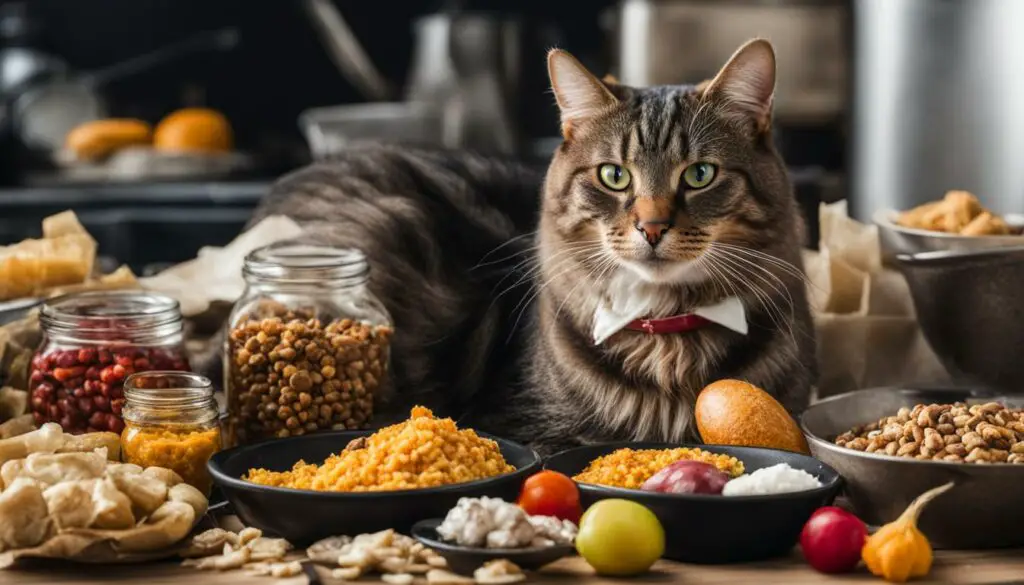
| Risks of Feeding Inappropriate Foods to Cats |
|---|
| Nutritional deficiencies |
| Digestive upset |
| Impact on overall health and well-being |
| Increased risk of health problems |
Seeking Professional Veterinary Advice
When it comes to your cat’s nutrition and diet, it is always wise to seek professional veterinary advice. A veterinarian can provide personalized guidance based on your cat’s specific needs, health conditions, and dietary requirements. Consulting a vet is especially important if your cat has eaten dog food and is experiencing health issues. A vet will be able to diagnose any potential problems and recommend the best course of action.
Veterinarians are trained experts in animal health and nutrition, and they have the knowledge and experience to assess your cat’s dietary needs. They can provide recommendations for suitable cat food that meets all the necessary nutritional requirements. Additionally, they can advise on any necessary dietary changes or medical intervention if your cat has consumed dog food and is sick.
Remember, each cat is unique, and their nutritional needs may vary. Seeking professional veterinary advice ensures that your cat receives the proper care and attention it deserves. A vet can guide you in making informed decisions about your cat’s diet to promote their overall health and well-being.
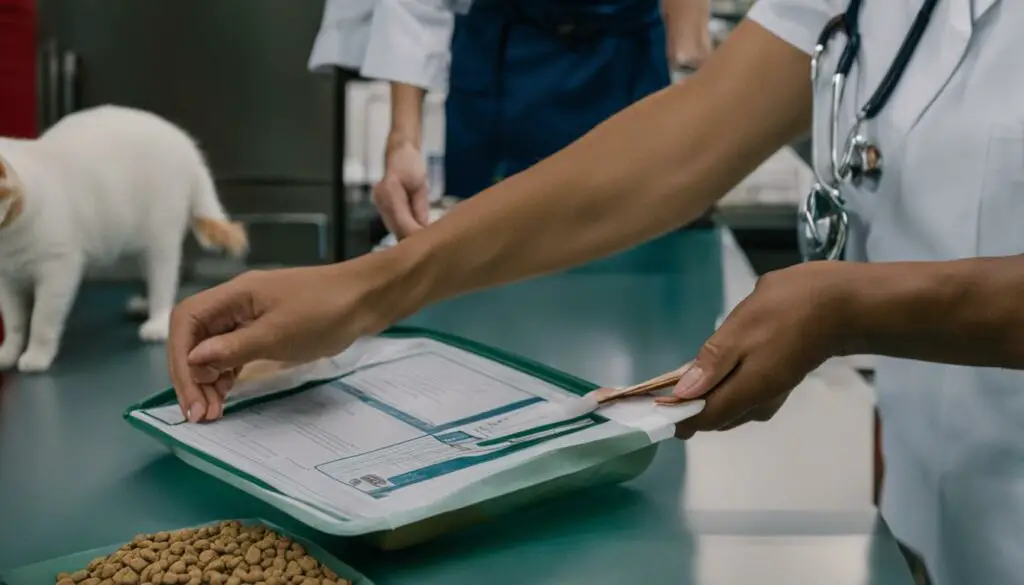
Why Consult a Vet for Your Cat’s Nutrition?
- A vet can provide personalized guidance based on your cat’s specific needs and dietary requirements.
- Veterinarians are trained experts in animal health and nutrition and can assess your cat’s dietary needs accurately.
- A vet can diagnose any potential health issues or deficiencies caused by consuming inappropriate foods like dog food.
- They can recommend suitable cat food that meets all nutritional requirements for your cat’s optimal health.
- Vets can advise on necessary dietary changes or medical intervention if your cat has eaten dog food and is showing signs of illness.
Remember, your cat’s well-being depends on the proper nutrition they receive. Seeking professional veterinary advice ensures that you make the best choices for your feline companion’s health. So, if you have any concerns about your cat’s nutrition or if they have consumed dog food and are experiencing health issues, don’t hesitate to consult a qualified veterinarian.
Conclusion
In summary, it is crucial to understand that cats and dogs have different nutritional needs. Feeding a cat dog food can lead to potential health problems due to the lack of specific nutrients that cats require, such as higher amounts of protein and taurine. If your cat has eaten dog food and is showing signs of illness, it is essential to consult a veterinarian for proper diagnosis and treatment.
Monitoring your cat’s behavior and contacting a vet if symptoms like vomiting, diarrhea, or stomach pain persist is important to ensure their well-being. Withholding food for a period and gradually reintroducing a bland diet, such as boiled chicken or fish, may help alleviate their symptoms. However, if your cat does not improve, further tests and treatment may be necessary.
Remember, cats rely on their food to meet their unique physiological needs. Feeding them a balanced diet specifically formulated for cats is vital for their long-term health and quality of life. Consulting a veterinarian for professional advice on your cat’s nutrition and dietary requirements is always recommended to ensure they receive the necessary nutrients and to prevent potential health issues.
FAQ
What should I do if my cat ate dog food and is now sick?
If your cat is experiencing symptoms of illness after eating dog food, it is important to contact a veterinarian for professional guidance and treatment.
Why do cats have different nutritional needs than dogs?
Cats are obligate carnivores and require higher amounts of protein and specific amino acids like taurine, which are not found in sufficient quantities in dog food.
Why do cats sometimes try dog food?
Cats may be curious and try dog food, but they often do not enjoy the taste or texture. They are picky eaters and have specific preferences when it comes to their food.
What are the symptoms of a cat eating dog food?
Symptoms of a cat eating dog food may include vomiting, diarrhea, nausea, drooling, and stomach pain. These occur because a cat’s digestive system is not designed to process dog food properly.
How can I remedy a cat that is sick from eating dog food?
The first step is to consult a veterinarian for proper diagnosis and treatment. They may recommend withholding food for a period of time and gradually reintroducing a bland diet to alleviate symptoms.
What are the nutritional differences between cat food and dog food?
Cat food contains higher levels of protein, taurine, and other nutrients that cats require, while dog food is formulated to meet the nutritional needs of dogs. Feeding a cat dog food can lead to nutritional deficiencies and health issues.
Can cat food be beneficial for dogs?
Cat food is specifically formulated for cats and may not provide the necessary nutrients for a dog’s optimal health. Feeding dogs cat food on a regular basis can result in nutritional imbalances and deficiencies.
What should I do if my cat ate dog food and is now sick?
Contact a veterinarian for professional advice and guidance on proper diagnosis and treatment for your cat. They will be able to recommend the best course of action based on your cat’s specific needs.
Can dog food be given to cats in an emergency?
In an emergency situation where cat food is not available, a small amount of dog food can be given to a cat temporarily. However, it is crucial to transition the cat back to a proper cat food as soon as possible.
How can I keep cats from eating dog food?
To prevent cats from eating dog food, it is important to feed them separately from dogs and supervise meal times. Creating separate feeding areas will help ensure that each pet consumes their appropriate food.
Why is proper nutrition important for cats?
Proper nutrition is crucial for maintaining a cat’s overall health and wellbeing. Cats have unique dietary requirements that must be met to ensure optimal nutrition and prevent potential health issues.
What are the risks of feeding inappropriate foods to cats?
Feeding inappropriate foods, such as dog food, to cats can result in nutritional deficiencies, digestive upset, and other health problems. Cats rely on specific nutrients found in their own food to support their unique physiological needs.
Should I consult a veterinarian for advice on my cat’s nutrition?
Yes, it is always advisable to consult a veterinarian for professional advice on your cat’s nutrition. They can provide personalized guidance based on your cat’s specific needs, health conditions, and dietary requirements.

